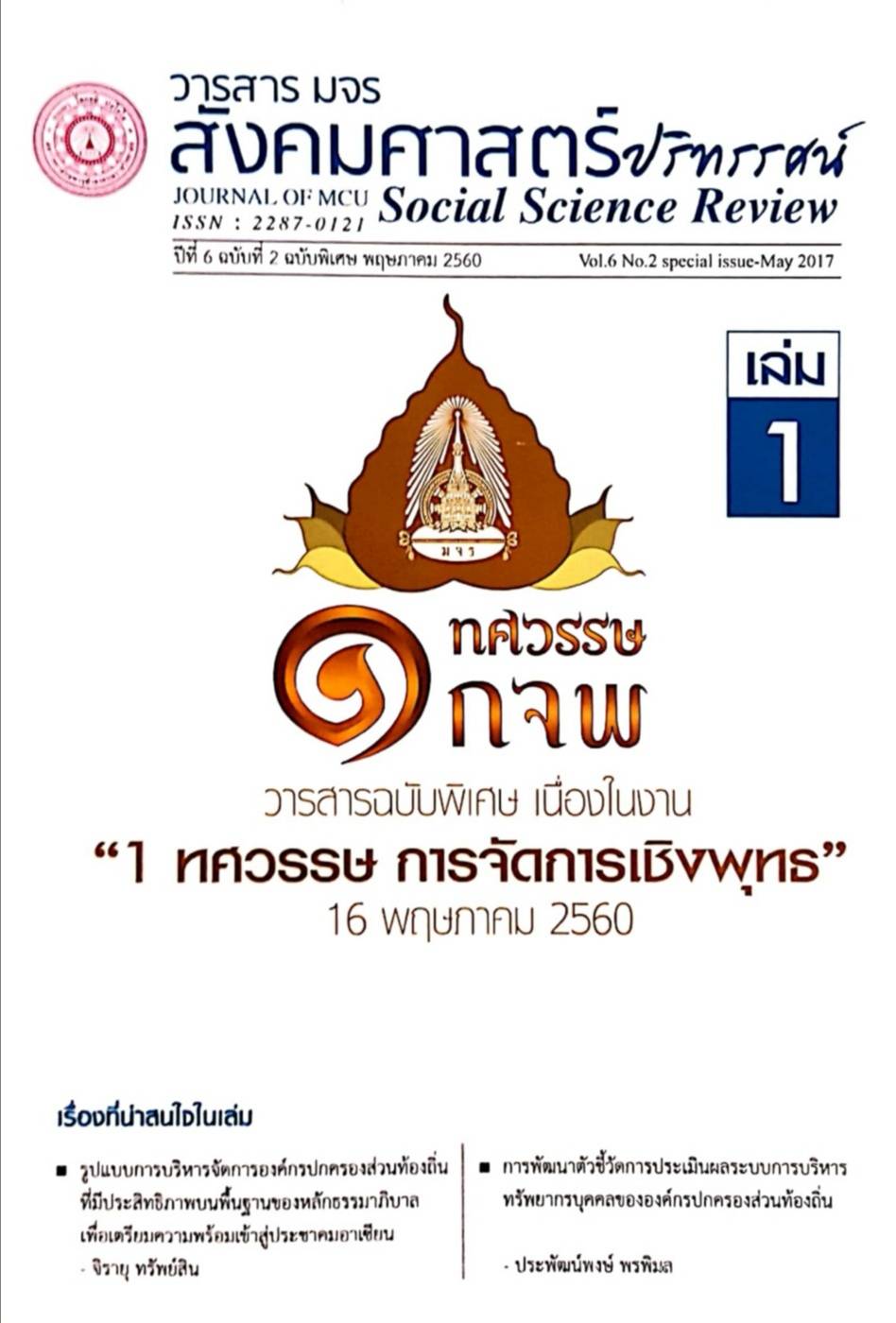ค่ายคุณธรรมเด็กและเยาวชน: การพัฒนารูปแบบการจัดการเพื่อสร้างภูมิคุ้มกันทาง วัฒนธรรมโดยภาคีเครือข่ายชุมชน ภาคอีสาน
คำสำคัญ:
ค่ายคุณธรรม เด็กและเยาวชน ภูมิคุ้มกันทางวัฒนธรรม ชุมชน ภาคอีสานบทคัดย่อ
การวิจัยครั้งนี้ มีความมุ่งหมาย ดังนี้ ประการแรกเพื่อศึกษาความเป็นมาของค่ายคุณธรรมเด็กและเยาวชน ภาคอีสาน ประการที่สอง เพื่อศึกษาสภาพปัจจุบันและปัญหาของการ
จัดการค่ายคุณธรรมเด็กและเยาวชน ภาคอีสาน และประการที่สามเพื่อศึกษาการพัฒนารูปแบบการจัดการค่ายคุณธรรมเด็กและเยาวชนเพื่อสร้างภูมิคุ้มกันทางวัฒนธรรมโดยภาคีเครือข่ายชุมชน ภาค
อีสาน โดยใช้รูปแบบการวิจัยเชิงคุณภาพ ดาเนินการวิจัยในพื้นที่ 3 จังหวัดๆ ละ 2 แห่ง คัดเลือกกลุ่มตัวอย่างแบบเจาะจง จานวน 102 คน เครื่องมือเก็บรวบรวมข้อมูลประกอบด้วย แบบสารวจ
แบบสังเกต แบบสัมภาษณ์ การสนทนากลุ่ม การตรวจสอบข้อมูลใช้เทคนิคตรวจสอบแบบสามเส้าและวิเคราะห์ข้อมูลตามความมุ่งหมายที่ตั้งไว้ และเสนอผลการวิจัยโดยพรรณนาวิเคราะห์
ผลการวิจัย พบว่า ความเป็นมาของค่ายคุณธรรมเด็กและเยาวชน ภาคอีสาน โดยภาพรวมค่ายคุณธรรมเด็กและเยาวชน ทั้ง 6 แห่ง มีการก่อตั้งขึ้นด้วยการที่ผู้บริหารหรือพระวิทยากรได้ศึกษาดู
งานจากค่ายคุณธรรม จริยธรรมที่มีชื่อเสียงในด้านการอบรม เช่น วัดชูจิตธรรมมาราม จังหวัดพระนครศรีอยุธยา ค่ายพุทธบุตร-พุทธธรรม วัดปัญญานันทาราม จังหวัดปทุมธานี เป็นต้น ต่อมานา
รูปแบบการจัดการค่ายมาประยุกต์ใช้ในการก่อตั้งค่ายคุณธรรมเด็กและเยาวชนขึ้นมาในจังหวัดของตนเอง สภาพปัจจุบัน และปัญหาของการจัดการค่ายคุณธรรมเด็กและเยาวชน ภาคอีสาน พบว่า
ด้านบุคลากรยังขาดแคลนบุคลากรที่มีความรู้ความสามารถ พระวิทยากรมีการเปลี่ยนตลอดโดยไปตั้งค่ายอบรมคุณธรรมเด็กและเยาวชนขึ้นมาใหม่ บางค่ายเปลี่ยนเจ้าอาวาสใหม่ก็เลิกอบรมงานค่าย
ไปจัดกิจกรรมอื่นแทน ด้านสถานที่ ศาลาอบรมบางแห่งมีความชารุดเสียหาย ขาดการบารุงรักษาและสภาพแวดล้อมไม่อานวยมีมลพิษ ด้านค่าใช้จ่าย ขาดแคลนงบประมาณ สนับสนุนในกิจกรรม
การอบรมค่ายคุณธรรมเด็กและเยาวชน ด้านวัสดุอุปกรณ์ เครื่องมือที่ใช้ในการอบรมมีอายุการใช้งานมานานมีความเสื่อมสภาพ ด้านวิธีดาเนินการ งบประมาณจัดงานไม่เพียงพอต่อการจัดอบรม
หลายวัน ขาดแคลนพระวิทยากร มีการประชาสัมพันธ์ตนเองน้อยและด้านหลักสูตรไม่มีเอกสารที่ชัดเจน พระวิทยากรยังขาดความรู้ความเข้าใจในการผลิตสื่อเทคโนโลยีที่ทันสมัย การพัฒนารูปแบบ
การจัดการเพื่อสร้างภูมิคุ้มกันทางวัฒนธรรมโดยภาคีเครือข่ายชุมชน ภาคอีสาน พบว่า ด้านบุคลากร ผู้บริหารฯ ควรมีวิสัยทัศน์คิดกว้าง มองไกล และมนุษย์สัมพันธ์ ส่วนพระวิทยากรต้องมี
ความรู้ เชี่ยวชาญในการอบรม ด้านสถานที่ ควรเป็นสถานที่มีความปลอดภัย สงบสะอาด ร่มรื่นเอื้อต่อการอบรม ด้านค่าใช้จ่าย การเก็บค่าใช้จ่ายต่างๆ ขึ้นอยู่กับความเหมาะสมตามสถานการณ์ที่
เปลี่ยนแปลงไป การบริหารด้านการเงิน คือทางานอย่างเป็นระบบ มีคณะกรรมการและขอรับการสนับสนุนจากหน่วยงานต่างๆ ด้านวัสดุอุปกรณ์ จัดงบประมาณซี้อวัสดุอุปกรณ์เพื่อเติมเพื่อใช้ในการอบรม
ด้านวิธีดาเนินการ ได้แก่การวิเคราะห์หลักสูตร ควรวิเคราะห์ให้มีความเหมาะสมกับวัย วุฒิภาวะและความต้องการของผู้เข้าอบรม การพัฒนาหลักสูตร ควรมีการนาศาสตร์ต่างๆ มาบูรณาการ
พัฒนาหลักสูตร มีการสาธิต แนะให้ทา นาให้ดู อยู่ให้เห็น การประเมินผล ควรประเมินจากการสังเกตเอกสาร และการกล่าวความรู้สึกในใจ ควรมีการบริการอย่างเป็นกันเอง และประชาสัมพันธ์
ค่ายลงในเว็บไซต์ โดยสรุป ค่ายคุณธรรมเด็กและเยาวชน : การพัฒนารูปแบบการจัดการเพื่อสร้างภูมิคุ้มกันทางวัฒนธรรมโดยภาคีเครือข่ายชุมชน ภาคอีสาน ทุกภาคีเครือข่ายภาคอีสานต้องร่วมมือ
กันส่งเสริมสนับสนุนให้เด็กและเยาวชนได้เข้าฝึกอบรมค่ายคุณธรรม เพื่อพัฒนาคุณภาพชีวิตให้ดีขึ้นต่อไป
เอกสารอ้างอิง
and values in students of the Rak Thai School of Business and
Technology, Suvarnabhumi District, Roi-Et Province. Mahasarakham:
Mahasarakham University.
Khamrod, U. (2006). A study of the problems and ways to strengthen learning
management in order to develop morals, values and the value of study
for students in Buddhist schools in the Singburi Education Area. PhD
Thesis, Singburi.
Kitikul, N. (2008). Organisation and management. Nakhon Pathom: Kasem Printing
Group.
Noochoo, S. (2003). Follow up Phra Dhammathayat after training program of Wat
Cholpratanrungsarit, Amphur Pakkret, Nonthaburi Province. Bangkok:
Thammasart University.
Ojanen, T.T., Boonmongkon, P., Samakkeekarom, R., Samoh, N., Cholratana, M. and
Guadamuz, T.E. (2015). Connections between online harassment and
offline violence among youth in Central Thailand. Child abuse & neglect,
44: 159-169.
Panbhakdi, N. (2010). Mechanism of the prevention of playing games lasting more
than three full hours [Online]. Journal of Culture Surveillance Centre,
8(2):12-16. Available at: http://www.m-culture.go.th/surveillance/images/
EBOOK/file1.pdf [Accessed 17th August 2016].
Pholwattana, N. (2007). Humanities, society and culture. Bangkok: Kasetsart
University.
Pleumpunya, M., Phutthiyani, W. and Cheunwattanapraniti, S. (1996). Results of
training in morals camps for new diploma students at Rajamangala
Institute of Technology, West Campus at Wat Umong, Mueang Chiang
Mai. Chiang Mai: Rajamangala University of Technology.
Ploykhow, S. et al. (2007). Acculturation and strengthening of values in domestic
children and youths. Bangkok: National Defense Studies Institute.
Pornsiripongse, S. (2007). Social capital and non communicable disease prevention:
experiences from Thailand. Mon-Khmer studies: a journal of Southeast
Asian languages and cultures, 37: 155-164.
Radcliffe-Brown, A.R. (1940). On social structure. The Journal of the Royal
Anthropological Institute of Great Britain and Ireland, 70(1): 1-12.
Saraphok, P., Boonmas, N. et al. (2004). Teaching principles and techniques of
nursing. Mahasarakham: Srimahasarakham Nursing College.
Sinawana, B. (2004). Duties of the Chalermprakiet Mental Development Centre: A
case study of Wat Srisawat, Muang District, Mahasarakham Province.
Mahasarakham: Mahasarakham University.
Somonnawat, S. (2005). Development of work procedures for strengthening the
morals and ethics of students at Baan Sisuk School, Saimoon District,
Yasothorn Province. Mahasarakham: Mahasarakham University.
Thaphong, P. (2006). The suitable form of management in moral camps for youths
in upper central Thailand. Journal of Isan Studies, 3(4): 5-14.
Trithunya, P. (2004). The role of monks in the development of ethics among
youths. PhD Thesis, Thammasart University, Bangkok.
Yamnil, S., Dharmadharo, P. and Supokro, S. (2005). A model of educational
management and dissemination of religious doctrine at Wat
Punyanundharam, Prathum Thani Province. Bangkok: Office of the
Permanent Secretary, Ministry of Education.
ดาวน์โหลด
เผยแพร่แล้ว
รูปแบบการอ้างอิง
ฉบับ
ประเภทบทความ
สัญญาอนุญาต
ลิขสิทธิ์ (c) 2020 วารสาร มจร สังคมศาสตร์ปริทรรศน์

อนุญาตภายใต้เงื่อนไข Creative Commons Attribution-NonCommercial-NoDerivatives 4.0 International License.
เพื่อให้เป็นไปตามกฎหมายลิขสิทธิ์ ผู้นิพนธ์ทุกท่านต้องลงลายมือชื่อในแบบฟอร์มใบมอบลิขสิทธิ์บทความให้แก่วารสารฯ พร้อมกับบทความต้นฉบับที่ได้แก้ไขครั้งสุดท้าย นอกจากนี้ ผู้นิพนธ์ทุกท่านต้องยืนยันว่าบทความต้นฉบับที่ส่งมาตีพิมพ์นั้น ได้ส่งมาตีพิมพ์เฉพาะในวารสาร มจร สังคมศาสตร์ปริทรรศน์ เพียงแห่งเดียวเท่านั้น หากมีการใช้ภาพหรือตารางหรือเนื้อหาอื่นๆ ของผู้นิพนธ์อื่นที่ปรากฏในสิ่งตีพิมพ์อื่นมาแล้ว ผู้นิพนธ์ต้องขออนุญาตเจ้าของลิขสิทธิ์ก่อน พร้อมทั้งแสดงหนังสือที่ได้รับการยินยอมต่อบรรณาธิการ ก่อนที่บทความจะได้รับการตีพิมพ์ หากไม่เป็นไปตามข้อกำหนดเบื้องต้น ทางวารสารจะถอดบทความของท่านออกโดยไม่มีข้อยกเว้นใดๆ ทั้งสิ้น





